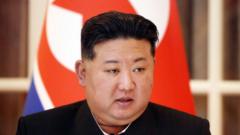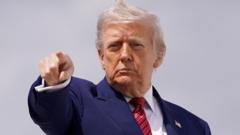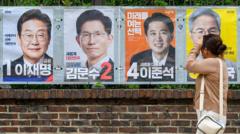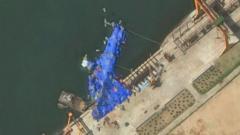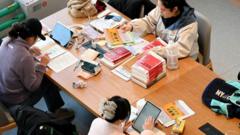**As the nation prepares for a critical decision, key issues emerged that the new president must address.**
### South Korea's Presidential Snap Election: What You Need to Know

### South Korea's Presidential Snap Election: What You Need to Know
**A pivotal election set for June 3 will determine South Korea's future leadership following a tumultuous political crisis.**
South Korea is preparing for a consequential snap presidential election on June 3, catalyzed by the recent ousting of Yoon Suk Yeol, who was removed from office after imposing martial law for six hours in December. This election, mandated by law due to Yoon's immediate impeachment, comes at a time of immense political and economic instability, necessitating a leader capable of navigating these turbulent waters over the next five years.
The backstory involves Yoon's controversial declaration of martial law amidst allegations of threats from both "anti-state forces" and North Korea. Initially deemed a response to legitimate concerns, it was soon revealed that Yoon's decision stemmed from personal political challenges. A week following this decision, the National Assembly impeached him, leading to a constitutional court validating the impeachment on April 4—prompting the upcoming election.
The interim governance has seen three acting presidents, with the latest, Lee Ju-ho, stepping in amid nationwide chaos marked by protests both for and against Yoon’s actions. Economic uncertainty was exacerbated as South Korea faced a 25% tariff on goods due to shifting U.S. trade policies under President Donald Trump, and relations with North Korea remain fraught after recent provocations.
Key issues in this election range from economic stability to handling diplomatic relationships, notably with China amid growing tensions. Additionally, the alarming decline in birth rates poses societal challenges that require immediate attention from the incoming president.
In terms of candidates, Lee Jae-myung of the opposition Democratic Party leads in polls, boasting a narrative of working-class advocacy. He is closely followed by Kim Moon-soo of the ruling party, who promotes economic growth and a business-friendly approach. Other candidates include Lee Jun-seok, Kwon Young-guk, and two independents, marking a diverse yet historically significant election devoid of female candidates for the first time in nearly two decades.
Voter participation opens on June 3, from 06:00 to 20:00 local time, with early voting conducted from May 20 to 25 for overseas citizens. Results are expected shortly after polls close, with the future leader swiftly taking office without the typical transition phase due to the abrupt end of Yoon's presidency.
As the nation grapples with the aftermath of Yoon's unprecedented decisions, the implications of this election resonate beyond South Korea, with geopolitical stakes and economic recovery in balance.
The backstory involves Yoon's controversial declaration of martial law amidst allegations of threats from both "anti-state forces" and North Korea. Initially deemed a response to legitimate concerns, it was soon revealed that Yoon's decision stemmed from personal political challenges. A week following this decision, the National Assembly impeached him, leading to a constitutional court validating the impeachment on April 4—prompting the upcoming election.
The interim governance has seen three acting presidents, with the latest, Lee Ju-ho, stepping in amid nationwide chaos marked by protests both for and against Yoon’s actions. Economic uncertainty was exacerbated as South Korea faced a 25% tariff on goods due to shifting U.S. trade policies under President Donald Trump, and relations with North Korea remain fraught after recent provocations.
Key issues in this election range from economic stability to handling diplomatic relationships, notably with China amid growing tensions. Additionally, the alarming decline in birth rates poses societal challenges that require immediate attention from the incoming president.
In terms of candidates, Lee Jae-myung of the opposition Democratic Party leads in polls, boasting a narrative of working-class advocacy. He is closely followed by Kim Moon-soo of the ruling party, who promotes economic growth and a business-friendly approach. Other candidates include Lee Jun-seok, Kwon Young-guk, and two independents, marking a diverse yet historically significant election devoid of female candidates for the first time in nearly two decades.
Voter participation opens on June 3, from 06:00 to 20:00 local time, with early voting conducted from May 20 to 25 for overseas citizens. Results are expected shortly after polls close, with the future leader swiftly taking office without the typical transition phase due to the abrupt end of Yoon's presidency.
As the nation grapples with the aftermath of Yoon's unprecedented decisions, the implications of this election resonate beyond South Korea, with geopolitical stakes and economic recovery in balance.






